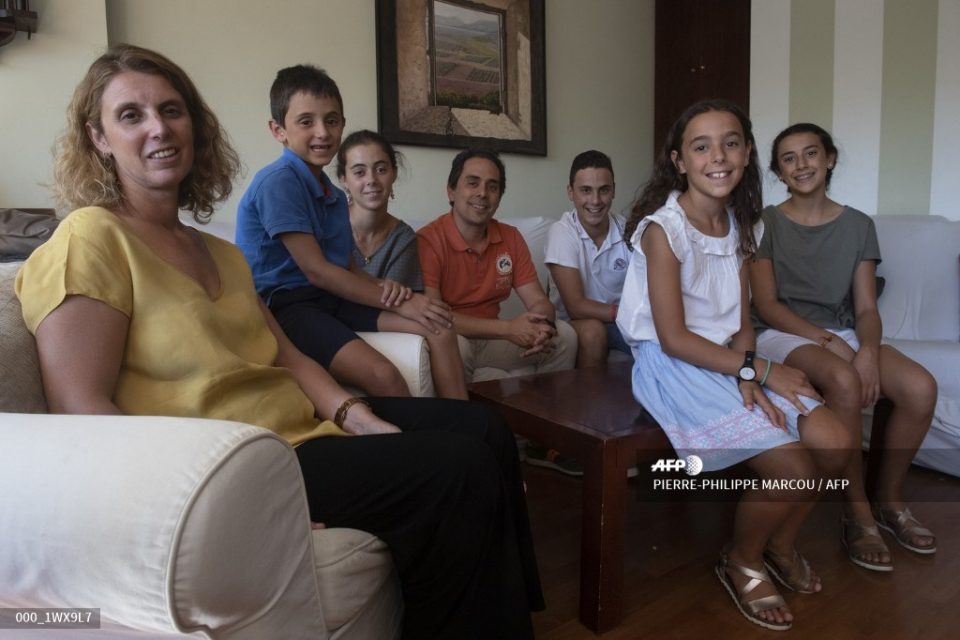
by Thomas PERROTEAU
Agence France Presse
MADRID, Spain (AFP) — With coronavirus cases surging as a new school year begins, many Spanish parents are refusing to send their children back to class despite the threat of sanctions.
“You have your whole life to learn, but if you lose your health, that’s it,” says Aroa Miranda, a 37-year-old mother-of-two who won’t send her boys to school this week when term resumes in the coastal town of Castellon de la Plana.
Like its European neighbours, Spain is reopening schools this month despite the rapid spread of the virus, with the country counting the highest number of new infections on the continent.
“Going back to school is being treated like an experiment, we’re like guinea pigs,” said Miranda, who is about to take her three-year-old off the nursery school list, which is voluntary at his age.
“For my eight-year-old, I will pretend he’s ill so I don’t have to send him to school.”
Although masks are obligatory in school for anyone aged six and over and social distancing measures have been put in place, she doesn’t think it’s enough.
“If I can’t meet with more than 10 people in my home, I don’t understand why my son has to be in class with 25 children,” she railed.
“This is an absurd safety risk.”
– ‘Risk-free doesn’t exist’ –
For weeks now, there have been a growing number of protests and petitions across Spain to demand better health and safety measures in schools.
An international Ipsos poll in July found most Spanish parents would back limiting the number of days children are in school, with one in four preferring to wait four to six months before sending them back.
In the face of the concerns, the authorities have swung between assurances of safety and threats of sanctions.
“Going back to school is safe,” Prime Minister Pedro Sanchez said Tuesday.
“It’s clear that ‘risk-free’ does not exist during an epidemic but there is a risk that we can avoid: that of social exclusion through not going to school.”
Fernando Simon, the health ministry’s emergencies coordinator, said nowhere was risk-free and that children could catch the virus in the park, from their cousins or through an adult who caught it at work.
“We can’t keep our children in a bubble,” he said, in remarks echoed this weekend by Education Minister Isabel Celaa.
“The safest place to be is in school and the benefits of being there are far greater than the possible risks,” she told Spain’s RNE public radio.
Many fear sending their children to school will put older family members at risk in a country where one in four families live with a relative who is over 65.
“I want to respect the law but if I have to choose between saving their lives or the lives of my parents, and sending my children back to school, it’s a no-brainer,” father-of-five Pablo Sanchez told AFP.
– ‘Let them fine me’ –
Others fear the economic impact if a child falls ill.
“If we have to confine ourselves at home for 15 days because of the school, my husband would not earn anything,” Miranda said.
The social security ministry has raised the possibility of extending a furlough scheme for parents forced to observe a period of preventative quarantine.
But reluctant families could technically face much heavier sanctions of “between one and three years in jail”, the Madrid region’s education chief warned last month.
It remains unclear to what extent the authorities will follow the letter of the law.
“That is the question everyone is asking now,” said Pedro Caballero, head of a Catholic parents’ association looking into the situation, which is fraught with legal uncertainties.
The education minister has also requested a study on the use of sanctions, without ruling them out.
“I must remind families that education is a human right for pupils, not for their parents. And the authorities are obliged to see this is respected between the ages of six and 16,” she told El Pais newspaper.
Miranda is not deterred.
“If they want to come to my home to fine me, then they fine me, my children are what is most important to me,” she said.
© Agence France-Presse







